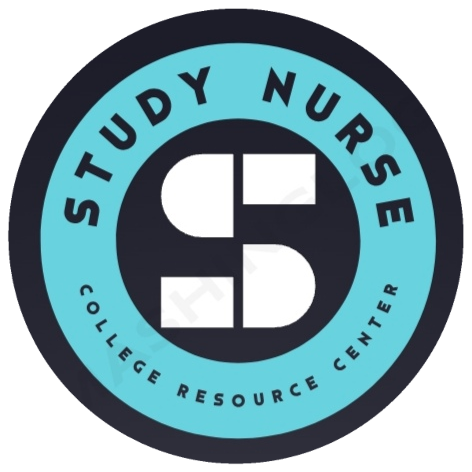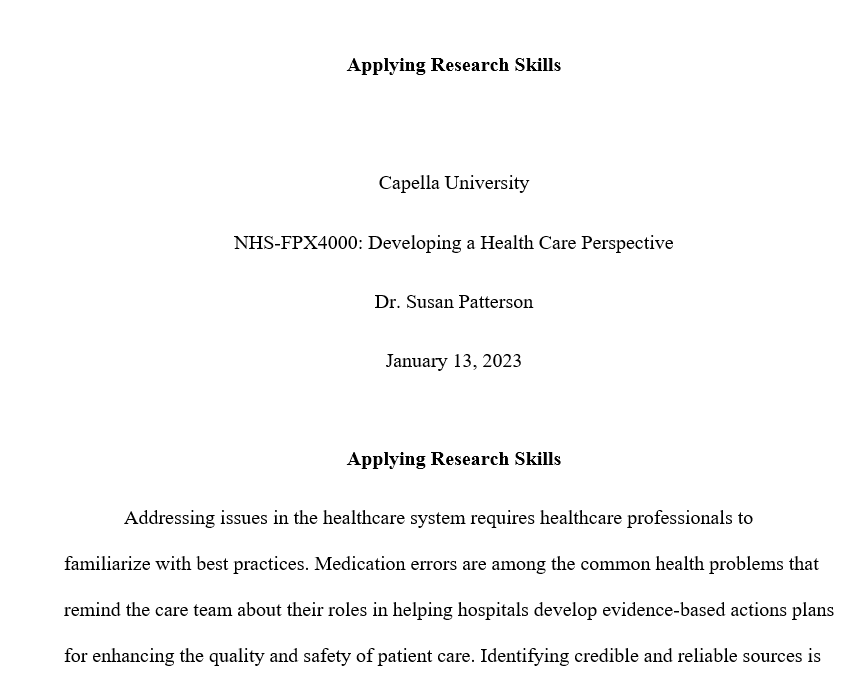Capella University
NHS-FPX4000: Developing a Health Care Perspective
Dr. Susan Patterson
January 13, 2023
Applying Research Skills
Addressing issues in the healthcare system requires healthcare professionals to familiarize with best practices. Medication errors are among the common health problems that remind the care team about their roles in helping hospitals develop evidence-based actions plans for enhancing the quality and safety of patient care. Identifying credible and reliable sources is an important step for healthcare professionals including nurse researchers to make informed conclusions about medication errors and interventions. This annotated bibliography largely includes peer-reviewed journal articles to provide current, authoritative, and accurate insights into medication errors, consequences, and prevention measures. Dorn VA Medical Center in South Carolina is an excellent example of a facility where a nurse administered doses of pegfilgtastim instead of filgrastim. The events led to severe acute lung injury, which caused the death of the patient.
Descripting the Topic: Medication Errors
Medication errors are preventable scenarios that trigger inappropriate medication use or patient harm. A patient takes the wrong medication or dosage, which expose patients to adverse drug reactions and potential death. Increased frequency of medication errors raises questions about the effectiveness of staff education, training, and adherence to recommended standards, policies, and procedures. Avoiding medication errors is a priority for organizations committed to enhancing competitive advantage in a complex healthcare environment. Peer-reviewed journal articles provide credible and reliable evidence on medication errors and related considerations. The PubMed Central database is an important source that helped retrieve articles from Frontiers in Medicine, Journal of Applied Medical Sciences, Nurse Education in Practice, and Journal of Nursing Care Quality. The keywords used include medication errors, safe medication administration, and medication safety. Narrowing the search to articles published within the last five years is crucial to access current evidence and make informed decisions about viable solutions for medication errors.
On credibility and relevance of information sources, the primary consideration was retrieving articles published in peer-reviewed journals within the last five years. Peer-reviewed journal articles are outcomes of thorough and independent reviews by scholars and researchers, which makes the sources ideal for addressing causes, consequences, and solutions for medication errors. The sources are also products of authors with immense experience in addressing quality and safety issues within the clinical environment. In this case, the authors produce purposeful and objective articles with evidence-based information on medication errors.
Annotated Bibliography
Kaneko, S., & Okada, M. (2018). Medication management factors associated with medication errors at Japanese long-term care facilities. Journal of Applied Medical Sciences, 7(1), 1-10. https://www.scienpress.com/Upload/JAMS/Vol%207_1_1.pdf
Kaneko and Okada’s findings on medication errors in long-term facilities provide insights into the need for a comprehensive approach for identifying and intercepting errors. The authors identified causes such as unsafe staffing levels, ineffective use of double-checks, limited knowledge of a drug, and disruptions. Predicting incidence of medication errors is crucial to allow the care team implement guidelines, safety rounds, and briefings, and double-checks. The rationale for using the article is the authors’ emphasis on a systemic approach for ascertaining the accuracy and safety of medications when dispensing and administering drugs.
Martyn, J., Paliadelis, P., & Perry, C. (2019). The safe administration of medication: Nursing behaviors beyond the five-rights. Nurse Education in Practice, 37, 109-114. https://s1106788.stacksdiscovery.com/sites/default/files/safe%20med%20admin%20for%20112_0.pdf
Martyn et al. addressed the relationship between nursing behaviors and medication errors. According to the authors, nurses have a core responsibility of administering medications in line with the recommended policies, standards, and procedures. The obligation requires nurses to understand the rights of safe medication administration, which include the right drug at the right time in the right dose and by the right route. Awareness of the rights reinforces consistent behaviors and attitudes necessary for preventing errors. The authors also highlighted the need for healthcare providers to address staff workload, interruptions, and access to resources. The aim is to empower the care team to maintain an error-free practice characterized by timely identification and interception of medication errors. The rationale for using the article is because it focuses on nurses and behaviors appropriate for strengthening capacity to administer medications safely.
Marufu, T., Bower, R., Hendron, E., & Manning, J. (2022). Nursing interventions to reduce medication errors in pediatrics and neonates: Systematic review and meta-analysis. Journal of Pediatric Nursing, 62, 139-147. https://www.pediatricnursing.org/action/showPdf?pii=S0882-5963%2821%2900257-8
Marufu et al. addressed the situation in pediatrics setting. According to the authors, children are more vulnerable to medication errors. The various causes include limited pharmacist involvement, absence of double-checks, interruptions, and failure to automate procedures. The findings also focus on educational interventions that make the care team familiar with the dynamics relevant for safe medication administration. The authors emphasized the need for hospitals to identify different causes of errors before implementing evidence-based interventions. The rationale for using the article is to remind hospitals about the need for extensive education, training, and briefings to address complexities of medication administration and multifaceted interventions to prevent potential errors.
Salami, I., Subih, M., Darwish, R., Al-Jbarat, M., Saleh, Z., Maharmeh, M., Alasad, J. & Al-Amer, R. (2019). Medication administration errors. Journal of Nursing Care Quality, 34 (2), 7-12. https://pubmed.ncbi.nlm.nih.gov/29975215/
Salami et al. focused on nurse perceptions to address the various causes of medication errors. The findings remind hospitals to prioritize interventions for reducing errors to safeguard brand reputation and avoid financial losses. Patients are vulnerable to wrong timing, wrong identification, and drug selection errors. Further, workload and the need for a distraction-free zone are primary concerns that influence the quality and safety of patient care. Focusing on nurses’ perceptions makes the article ideal for addressing the multiple causes of medication errors. The article also acknowledges nurses’ roles in sharing suggestions on effective quality and safety assurance programs in relation to medication administration.
Lesson Learned
This task provided opportunities to appreciate the purpose of an annotated bibliography in nursing research. In this sense, I realized that credible and reliable evidence from peer-reviewed articles enables nurse researchers to make informed conclusions about weaknesses and improvements necessary to enhance the quality and safety of patient care. Focusing on medication errors, which is among the most sensitive aspects, also provided insights into the need for utilization of credible sources to understand complexities in the care system and multifaceted solutions for medication administration errors.
References
Kaneko, S., & Okada, M. (2018). Medication management factors associated with medication errors at Japanese long-term care facilities. Journal of Applied Medical Sciences, 7(1), 1-10. https://www.scienpress.com/Upload/JAMS/Vol%207_1_1.pdf
Martyn, J., Paliadelis, P., & Perry, C. (2019). The safe administration of medication: Nursing behaviors beyond the five-rights. Nurse Education in Practice, 37, 109-114. https://s1106788.stacksdiscovery.com/sites/default/files/safe%20med%20admin%20for%20112_0.pdf
Marufu, T., Bower, R., Hendron, E., & Manning, J. (2022). Nursing interventions to reduce medication errors in pediatrics and neonates: Systematic review and meta-analysis. Journal of Pediatric Nursing, 62, 139-147. https://www.pediatricnursing.org/action/showPdf?pii=S0882-5963%2821%2900257-8
Salami, I., Subih, M., Darwish, R., Al-Jbarat, M., Saleh, Z., Maharmeh, M., Alasad, J. & Al-Amer, R. (2019). Medication administration errors. Journal of Nursing Care Quality, 34 (2), 7-12. https://pubmed.ncbi.nlm.nih.gov/29975215/

